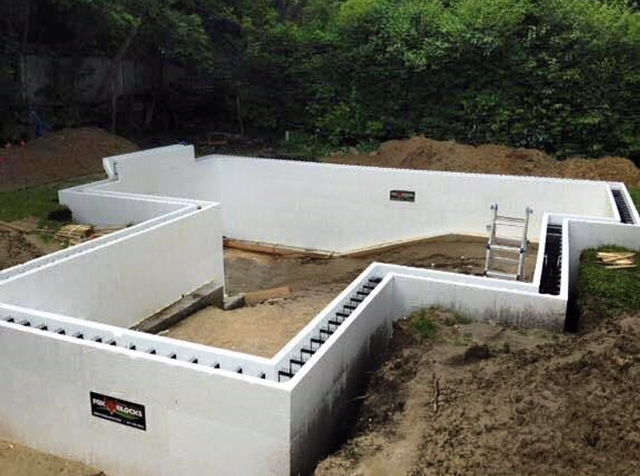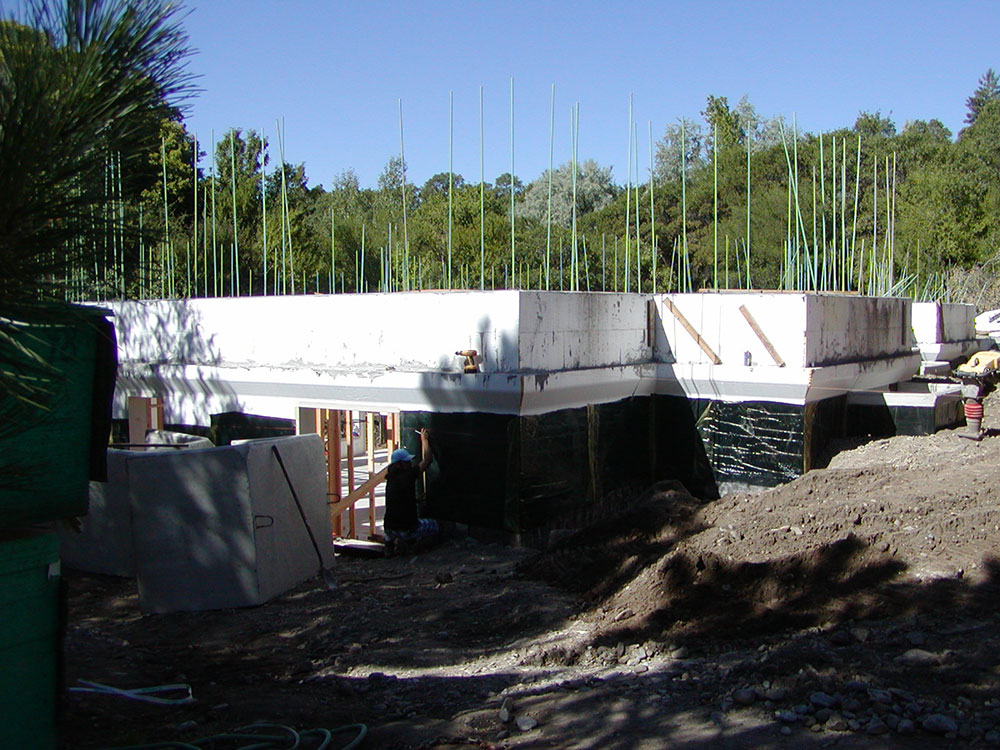
What R-Value Do You Need for Basement Walls?


A common question many homeowners ask is, “What R-value do I need for my basement walls, and why is it important?”
An airtight and moisture-protected basement, along with the correct basement insulation, R-value (resistance) will increase the comfort level throughout the entire home, save on energy costs, improve durability, and reduce infiltration of moisture, soil gases, and other pollutants or irritants into the house.
Below-grade walls require continuous insulation (CI) with the correct R-value for basement walls. Typically, builders install insulation (sprayed foam, foam board, and/or fiberglass) on the exterior of the wall, which helps insulate the whole house. Unfortunately, these traditional insulation products may leak or absorb moisture, diminishing the insulation’s value.
Fortunately, insulated concrete forms (ICFs) are a superior solution to achieving and exceeding the R-value requirements for basement walls. ICF’s thermal mass and moisture resistance ensure a comfortable, healthy, and durable home. ICF basement walls can lessen energy use by 20 to 50 percent.

What is a Good R-Value for Basement Insulation?
The R-value of insulation indicates its resistance to heat flow (convection, conduction, and radiation) through a given material thickness.
The transfer of heat by airflow produces thermal convection.
The transfer of heat on the molecular level results in thermal conduction.
The transfer of heat by solar energy creates thermal radiation.
The best R-value insulation for basement walls will save a homeowner money on heating and cooling and ensure a dry-comfortable-healthy living space. An adequate R-value for basement walls should minimize thermal bridging, reduce heat loss through the foundation, resist moisture intrusion, protect the damp-proof coating from damage during backfilling, and reduce condensation on basement surfaces.
What R-Value Do I Need for Basement Walls?
The proper R-value of basement walls will produce energy-efficient, durable, healthy, and comfortable homes. The International Energy Conservation Code (IECC) mandates the basement insulation R-values based on eight geological climate zones in the United States. The IECC updates the values every three years.

Changes in 2021 IECC Basement R-Value Insulation Code
The recent 2021 IECC added an option for basements in climate zones 5 – 8 and Marine 4. The changes allow for interior R-13 insulation with exterior R-4 insulation. The 2018 IECC permitted R-15 continuous insulation on either the interior or exterior or R-19 cavity on the interior. In addition, the changes allow builders to use 2×4 framing for the exterior basement walls instead of 2×6 studs.
Moisture intrusion, condensation and the thermal bridging of wood studs may present future problems and performance issues for wood studs and batt insulation in basement walls.

ICFs Exceed the R-Value You Need for Your Basement Wall
Homeowners can avoid the confusion of determining what R-value for basement walls accommodates their climate zone by choosing Fox Blocks ICF. Fox Blocks ICF (R-23) far exceeds the ASHRAE 90.1 minimum R-value requirements for continuous insulation in all climate zones.
How to Build a Fox Blocks ICF Basement Wall

Fox Blocks ICFs are an all-in-one wall assembly that allows for quick and low-risk basement construction. It combines five-building steps into one, including insulation, air barrier, vapor retarder, structure, and attachment. The all-in-one wall system lessens the need to coordinate multiple trades, saving money and significantly hastening the project time while still achieving all of the basement wall's goals: energy efficiency, disaster resistance, durability, and excellent indoor environmental quality below-grade spaces.
All ICF below grade walls, in contact with the earth, must be covered with a direct applied, compatible waterproofing or dampproofing membrane.
Disaster-resistant Fox Blocks ICFs protect a family from severe wind events and fires.
Fox Blocks, with steel-reinforced concrete, can withstand tornado and hurricane winds exceeding 200 mph and projectile debris moving over 100 mph.
Fox Blocks achieve a fire-resistance rating (ASTM E119) of 4 hours for the 6-inch blocks and 2 hours for the 4-inch blocks.
Fox Blocks produce durable and healthy basement walls. The wall assembly includes a vapor retarder that contributes towards a moisture-resistant basement wall. However, the Fox Blocks system needs a dependable perimeter drainage system and waterproofing membrane to ensure moisture resistance for below-grade walls.
Fox Blocks promote a healthy basement because they contain little to no VOC.
Fox Blocks further contributes towards a durable basement because they lack organic materials - something termites like to eat. However, Fox Blocks recommends Polyguard Products, Inc. 650 XTM or 650 XTP membranes to ensure protection against termites.
Fox Blocks Series ICF provides a basement wall system with high sound reduction. It achieves a high ASTM E90 Sound Transmission Classification (STC) rating of greater than 50.
Fox Blocks ICFs Are the Best R-Value Insulation for Basement Walls
Fox Blocks moisture-resistant ICF basement walls surpass the R-value needs for all climate zones, ensuring an energy-efficient, comfortable, safe, durable, and healthy home with manageable energy bills. Contact Fox Blocks today for more help on deciding what R-value you need for your basement walls.